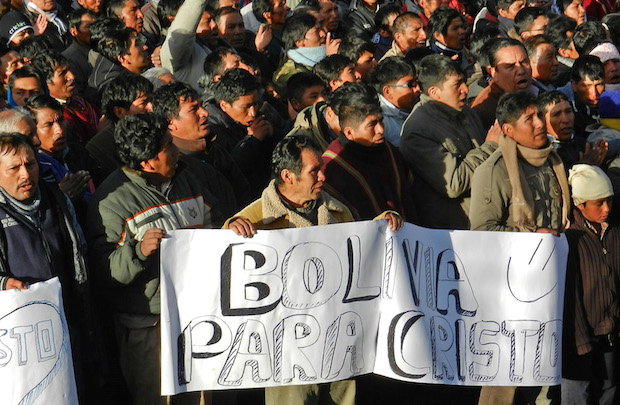How do Protestants differ from non-Protestants in their behaviour? Are their communities more democratic, horizontal or concerned by their neighbours? Do they have less corruption and abuse?
 Demonstration in Bolivia.
Demonstration in Bolivia.
One of the most striking revelations of the Pew Research Center study is that there has been a move away from the Church teachings amongst the Catholics in Latin America.
As I explained in my previous article, the Pew Research Centre has provided some statistical evidence about the strength of Pentecostalism in the evangelical world in Latin America. It is also notable how Pentecostalism is quite prominent in the Catholic Church, where it is referred to as ‘charismatic renovation’.
Amongst those countries where the percentage of self-defined ‘charismatics’ exceeded 50% we find Panama with 71%, Brazil with 58%, Honduras with 55%, the Dominican Republic with 52% and El Salvador with 50%. This shows how the charismatic movement has taken hold of many Latin American countries and represents a majority amongst all other Christian denominations.
On the other side of the spectrum, those countries which had a smaller number of charismatics included Uruguay (14%), Argentina (20%), Chile (23%), Colombia (24%) and Mexico (27%).
Whilst Pentecostalism/neo-Pentecostalism is growing rapidly in the Latin American Protestantism, the so called ‘charismatic renovation’ is doing the same amongst the Catholics. This has caused many Catholics to leave the Catholic church altogether and become Pentecostals/neo-Pentecostals.
According to the Pew Research Center, some of the activities that the new Catholic charismatics carry out on a regular basis include Bible study home groups, attendance to mass congress and emotive liturgy. However, unlike the evangelical Pentecostals, they give less importance to divine healings, prophetic revelations, exorcisms and speaking in tongues.
The separation between church and state had more support in 13 out of all 19 countries studied. Uruguay, Mexico and Chile were the three countries which gave more support to the church-state divide, with 75%, 74% and 70% respectively. Other countries which did not support such division so widely included the Dominican Republic and El Salvador with 42%, Paraguay with 44% and Guatemala with 46%.
The study also showed that there is a general move away from the traditional teachings of the Church amongst the Catholic population, as well as a tendency towards conservatism within the Protestants in terms of morals and ethics.
It is clear that, as the research demonstrates, there is a steady growth in the evangelical church in Latin America and this is predominantly Pentecostal. In some countries the move from the Catholic to the Protestant church has been very dramatic, suggesting that perhaps this move is more nominal than genuine, as there are few drastic changes made with the switch.
Although the growth in the protestant church has been significant in Latin America, this has not been followed up with discipleship. This gives an impression of a simple numerical growth with no depth or real cultural change. Proof of such changes would be seen in behaviour and beliefs.
How do Protestants differ from non-Protestants in their behaviour? Are their communities more democratic, horizontal or concerned by their neighbours? Do they have less corruption and abuse, or are the changes just nominal and liturgical without real transformation?
There are no clear-cut answers to the questions above. It will depend on how doctrine is interpreted and applied practically, both in personal life and in the community. There are already a number of studies which try to bring light on these questions.
Protestantism has been present in Latin America now for more than half a century, even if seen as alien by many. The last four decades have seen a rapid growth within the Continent. At first, the new Protestants tried to survive in a hostile environment, striving to create space for the development of their faith by providing an alternative to the traditional Latin American Catholicism. The challenge for the new generations is to promote a faith that is not just nominal, but that has cultural relevance in a society with historical restlessness. The Protestant Church needs to become a transforming force in order to change what Gabriel García Márquez described during his acceptance speech at the Nobel Price - ‘the huge reality’ of Latin America.

Las opiniones vertidas por nuestros colaboradores se realizan a nivel personal, pudiendo coincidir o no con la postura de la dirección de Protestante Digital.
Si quieres comentar o